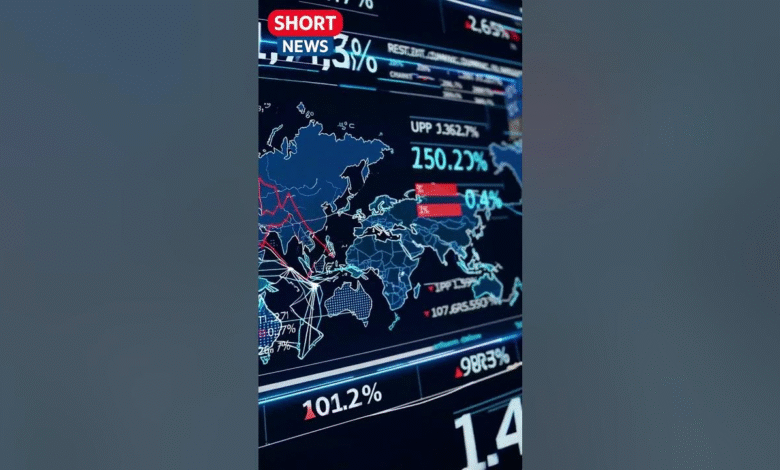US-China Trade Talks: Markets on Edge After Geneva Meeting

The ongoing US-China trade talks have become a focal point for market watchers and financial analysts, as both nations aim to resolve their enduring trade tensions. In Geneva, high-level discussions led by U.S. Treasury Secretary Scott Bessent and Trade Representative Jamieson Greer, alongside China’s Vice Premier He Lifeng, have shown promising signs of progress. As tariffs impact economies on both sides, the implications of these negotiations extend far beyond trade, influencing global market volatility and even the cryptocurrency landscape. Analysts are keenly observing the potential outcomes, anticipating how a new trade deal could reshape relationships and foster stability in uncertain economic times. With stakes running high, the world awaits the results from Geneva, hoping for a resolution that reduces tariffs and restores harmony to international trade.
In the latest round of diplomatic engagement between the United States and China, discussions are critically underway, highlighting the delicate balance of their trade relations. The high-stakes Geneva negotiations have captured global attention, serving as a vital platform for both nations to address longstanding grievances and negotiate terms that could alleviate mutual tariffs. Market analysts have noted the potential ripple effects that these trade deliberations could bring about, impacting not only traditional equities but also burgeoning financial domains such as cryptocurrencies. As officials from both governments navigate this intricate landscape, questions loom regarding the sustainability of agreements made and their broader implications for global market stability. Observers from various sectors are eager to see if these talks can deliver a robust trade deal that reassures investors and curbs ongoing volatility.
The Impact of US-China Trade Talks on Global Markets
The ongoing US-China trade talks, nestled deep within the economic landscape, are capturing the attention of global markets. As key negotiators from both sides make strides in Geneva, financial analysts are keenly observing how these discussions will influence market movements. The anticipation surrounding a potential trade deal is palpable, with stocks, cryptocurrencies, and commodities poised for reactions based on the negotiations’ outcomes. Tariffs impact, in particular, remains a pivotal theme as economists anticipate whether significant reductions will be part of the final agreement.
Market volatility stemming from the trade tensions has been historically high, with the Cboe Volatility Index indicating traders’ concerns. As the trade talks progress, markets could either stabilize or react sharply—especially if positive signals emerge from Geneva. Analysts postulate that any agreements to retract tariffs could lead to equity rallies, significantly boosting confidence among investors. The ripple effects of these talks could extend beyond just stock prices to influence commodity prices and cryptocurrency valuations, as an improved economic outlook tends to invigorate risk assets.
Geneva Negotiations: A Turning Point in US-China Relations
The Geneva negotiations symbolize a pivotal moment in US-China relations, marked by cautious optimism from both parties. Stakeholders are infused with hope as the dialogue unfolds, with top U.S. officials indicating that the discussions have been productive. The possibility of a successful resolution may signify a much-needed thaw in relations, presenting opportunities for a new trade deal that could stabilize not only bilateral ties but also global economic conditions. The sensitivity of these talks underscores their potential impact on tariffs and market reactions.
For instance, the rapidmarket adjustments following remarks from negotiators indicate how closely events are intertwined with market sentiment. Any shift in the tone of commentary from the US administration, especially from President Trump, can wield considerable influence on investor psychology. With the stakes so high, both sides understand that the outcome of the Geneva meetings could either exacerbate market volatility or pave the way toward economic cooperation that alleviates historical frictions.
Tariffs Impact: How Trade Talks Could Reshape the Economy
As negotiations continue, the impact of tariffs looms large over the discussions between the U.S. and China. High tariffs have stifled trade and contributed to heightened market volatility—disrupting supply chains and inflating consumer prices. Analysts believe that if the Geneva talks yield a reduction in tariffs, the immediate effects would benefit both nations’ economies. An easing of tariffs could invigorate trade flows, stimulating domestic industries and enhancing consumer spending, thereby restoring confidence among investors.
Moreover, the implications of lowering tariffs extend far beyond the U.S. and China; the global economy stands to benefit as well. Reduced uncertainty regarding trade relations can lead to increases in foreign direct investment (FDI), as businesses look to capitalize on a more stable environment. This could also provide a more favorable backdrop for crypto markets, where clarity in regulatory frameworks can drive investment flows and innovation—a critical factor for assets like Bitcoin and Ethereum.
Market Volatility: The Ripple Effects of Trade Negotiations
The heightened market volatility observed during the US-China trade talks acts as a barometer for investor sentiment. With asset prices oscillating based on the latest developments from Geneva, stakeholders are on edge, analyzing every headline and rumor. The S&P 500, recovering but not fully healed, reflects the struggle investors face in gauging future risk amid ongoing uncertainties. Market participants are increasingly reliant on news from the negotiations, making real-time analysis crucial as dialogues unfold.
Volatility is a double-edged sword; while it presents opportunities for savvy traders, the unpredictability can be detrimental to long-term investors. As news breaks from Geneva, reactions can create instant fluctuations in stock prices, commodity values, and cryptocurrencies. Investors approach these situations cautiously, understanding that even minor statements from officials can catalyze significant market shifts, emphasizing the critical need for strategic positioning during such times.
Cryptocurrency Effects: Navigating Trade Talks and Market Dynamics
The potential outcomes of the US-China trade talks extend their influence into the cryptocurrency market, where the unexpected intertwines with conventional financial dynamics. A trade deal could usher in increased investor confidence, possibly fuelling a bullish sentiment in digital currencies. Cryptocurrencies, being viewed as alternative assets often used during economic upheavals, may see elevated interest should tariffs decrease and trade tensions ease.
Conversely, should negotiations falter or produce negative results, the opposite could transpire, with cryptocurrencies experiencing heightened sell-offs as traditional markets swirl in uncertainty. Traders are keenly aware of the interconnectedness of these events; thus, monitoring developments from Geneva could yield tactical advantages for crypto investors. As sentiments shift with each update from U.S. and Chinese representatives, the crypto landscape may reflect broader economic trends, making it vital to stay attuned to any trade agreement outcomes.
The Role of Negotiators in US-China Talks
The U.S. and Chinese negotiators play a critical role in shaping the discussions in Geneva, with their leadership fundamental to the outcomes of the trade talks. High-profile figures such as Treasury Secretary Scott Bessent and Trade Representative Jamieson Greer are on the frontlines, tasked with navigating complex issues of tariffs and trade terms. The stakes have never been higher, as their negotiations can significantly affect both national economies and global financial systems.
As seasoned diplomats engage in this delicate balancing act, their management of both details and the narrative surrounding the negotiations is vital. With each round of discussions, the decisions made at the table have ripple effects that extend beyond immediate tariff implications, impacting policy-making and investment strategies worldwide. The outcomes they negotiate will be scrutinized closely as they reflect a broader vision for future U.S.-China relations.
Market Reactions to Trade Agreement Announcements
Market responses to announcements regarding the US-China trade talks are inherently volatile, often leading to immediate fluctuations across a range of asset classes. Each key statement or rumor from negotiators can provoke decisive actions from traders—ranging from stock buy orders to Bitcoin transactions. Historically, major announcements regarding tariff reductions have coincided with upward price movements in equities, highlighting the sensitivity of investors to these developments.
Consequently, the anticipation surrounding Geneva has created a heightened state of readiness among market participants. Those watching commodity prices, such as gold, often regard trade talks as indicators. If tariffs are reduced, it historically creates a backdrop conducive for equities to outperform, while gold usually reacts with downward pressure. Understanding these market dynamics is crucial for developers and investors alike, as they navigate through the implications of trade agreements and their subsequent fallout.
Future Implications of a US-China Trade Deal
A successful US-China trade deal could reshape not just the bilateral economic relationship but also influence global trade patterns. With both countries navigating complex economic landscapes, a pivotal agreement may encourage collaboration, leading to more stable and predictable trade practices. This outcome could enhance global economic growth, acting as a catalyst for recovery amidst the uncertain environment that has persisted due to previous tariffs.
However, the permanence of such changes often hinges on the ability of leaders to maintain momentum post-negotiation. For markets, a consistent commitment to collaborative policies will be essential to restoring confidence. The future implications of a renewed trade relationship could extend to partnerships in technology, environmental policies, and currency stabilization efforts, thereby inviting a plethora of opportunities beyond just immediate trade benefits.
Navigating Risks in the Wake of Trade Talks
As markets await outcomes from the trade talks, understanding the associated risks has become increasingly vital for investors. The volatility stemming from trade tensions is a reminder of the tenuous nature of global economic interdependencies. Stakeholders need to navigate these uncertainties carefully, employing strategies that involve diversification across asset classes to mitigate risks.
Moreover, the outcome of the Geneva talks may provoke different reactions across sectors, prompting investors to reassess their positions. Potential sectoral shifts could emerge as industries realign in response to new trade policies. By carefully monitoring trade negotiations and remaining agile, traders can position themselves advantageously, ready to capitalize on any emerging trends stemming from these high-stakes discussions.
Frequently Asked Questions
What are the main objectives of the current US-China trade talks?
The current US-China trade talks aim to ease tensions between the two countries, focusing on reaching a trade deal that addresses tariffs and trade deficits. This includes negotiations in Geneva where officials from both sides seek to establish a framework for future discussions and reduce the substantial tariffs imposed on each other’s imports.
How do tariffs impact the US-China trade talks?
Tariffs significantly impact the US-China trade talks as they create economic barriers that hinder free trade between the two nations. The ongoing negotiations are partly focused on reducing these tariffs to promote market stability and alleviate the financial strain caused by rising costs for consumers and businesses.
What market volatility can arise from the US-China trade negotiations?
Market volatility can escalate from the US-China trade negotiations due to investor speculation and reactions to any progress or setbacks in the talks. Positive outcomes may lead to rallies in equity markets and cryptocurrencies, while negative news could trigger declines, showcasing the delicate balance of investor sentiment influenced by the negotiations.
What role do cryptocurrencies play in the context of US-China trade talks?
Cryptocurrencies are affected by the US-China trade talks as market sentiment shifts based on the outcomes of the negotiations. A favorable trade deal could boost confidence in risky assets like digital currencies, potentially leading to price increases, while uncertainty can generate downward pressure on these markets.
What can markets expect if a trade deal is reached between the US and China?
If a trade deal is successfully reached between the US and China, markets can expect a surge in equity prices, a potential rally in cryptocurrencies, and possibly a decline in gold prices as investor confidence improves. The resolution of tariff issues could stabilize market conditions and reduce volatility.
How have recent statements from US officials influenced US-China trade talks?
Recent statements from US officials have heavily influenced US-China trade talks by shaping market expectations and perceptions. Positive remarks, such as those suggesting significant progress, can create optimism that boosts market performance, while vague or cautious communications may lead to increased uncertainty and volatility.
| Key Point | Details |
|---|---|
| Participants of Talks | U.S. Treasury Secretary Scott Bessent, U.S. Trade Representative Jamieson Greer, and China’s Vice Premier He Lifeng. |
| Location and Context | Held in Geneva, Switzerland amidst ongoing U.S.-China trade tensions and tariffs imposed by both nations. |
| Market Reactions | Markets are experiencing volatility, with significant attention on indices like the S&P 500, cryptocurrencies, and gold prices. |
| Remarks from Trump | Trump indicated talks were progressing positively, suggesting a potential reset in US-China relations. |
| Confidentiality of Talks | Delegates avoided media interactions to prevent misinterpretation that could disrupt markets. |
| Outcomes and Expectations | Agreement on trade issues was hinted at, with urgency around the $1.2 trillion U.S. trade deficit emphasized. |
Summary
The US-China trade talks are pivotal for the global economy, as market analysts closely monitor the developments between the two nations. The discussions held in Geneva not only addressed the current trade standoff but also aimed at redefining future economic relations. With both parties indicating a willingness to engage and resolve issues, the outcomes of these talks could determine the trajectory of international trade policies, potentially easing market volatility and fostering a more stable economic environment.




